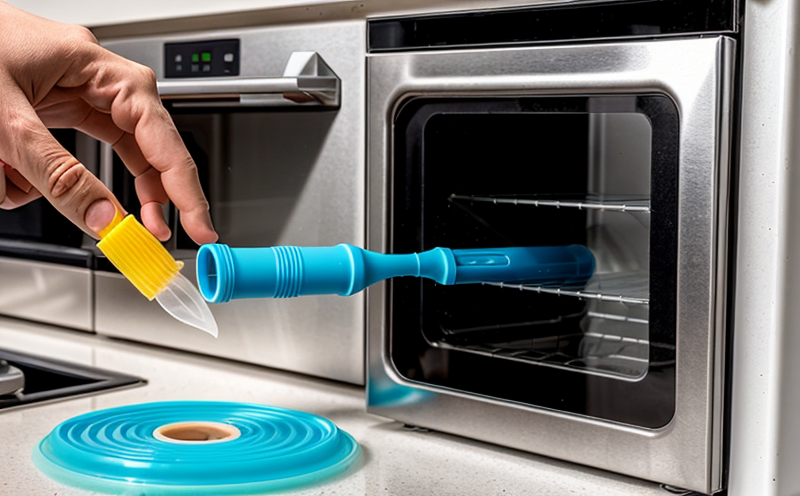ASTM D256 Izod Impact Testing of Household Plastics
The ASTM D256 test method is a critical standard for assessing the impact strength of household plastics. This test evaluates how well materials withstand sudden, sharp impacts without fracturing or breaking. It’s an essential tool in quality assurance and R&D, particularly for household products where durability under stress can significantly affect product longevity.
Understanding the Izod impact test is crucial for manufacturers to ensure their products meet safety standards and consumer expectations. The test involves striking a notched specimen with a specified pendulum at a defined speed and measuring the energy absorbed by the material in joules per meter (J/m). This metric provides valuable insights into the toughness of plastic materials.
The ASTM D256 Izod impact test is widely used across various sectors, including electronics, automotive components, packaging, and household items. For household plastics specifically, this test ensures that products like containers, lids, and utensils can withstand everyday stresses without breaking or deforming. This service helps manufacturers make informed decisions about material selection and product design.
The testing process itself is straightforward but requires precise instrumentation to ensure accurate results. Specimens are typically notched according to ASTM standards for consistent test conditions. The apparatus used includes a pendulum of known mass swinging at a set speed, striking the specimen held on a rigid support. The force absorbed by the material determines its impact strength.
The importance of this test cannot be overstated. It helps prevent product failures that could lead to safety hazards or consumer dissatisfaction. By adhering to ASTM D256 standards, manufacturers can ensure their products meet industry benchmarks and regulatory requirements. This service ensures that every household plastic product undergoes rigorous testing to guarantee its durability.
Real-world applications of this test are vast. For instance, a manufacturer might use ASTM D256 to determine if the lid of a food container is sturdy enough for repeated opening and closing without breaking. Another example could be assessing whether a kitchen utensil can withstand being dropped multiple times on hard surfaces. Each application highlights the importance of ensuring household plastics meet rigorous standards.
Why It Matters
The ASTM D256 Izod Impact Testing is not just a technical exercise; it’s a critical component in ensuring product safety and quality. By evaluating the impact strength of household plastics, this test helps manufacturers identify potential weaknesses early in the design process. This proactive approach ensures that products are robust enough to withstand everyday stresses without compromising consumer safety.
From a regulatory standpoint, compliance with ASTM D256 standards is often mandatory for certain types of household products. Non-compliance could lead to product recalls and legal issues. Additionally, meeting these standards can enhance brand reputation by demonstrating a commitment to quality and safety.
The test’s significance extends beyond compliance. It also influences consumer perceptions and purchasing decisions. Products that pass ASTM D256 are often seen as more reliable and durable, which can lead to increased market share for manufacturers. In competitive markets, this service provides a clear advantage by ensuring products meet or exceed industry standards.
Moreover, the test plays a crucial role in R&D efforts. By identifying which materials perform best under impact stress, researchers can innovate and develop new formulations that enhance product performance. This continuous improvement cycle ensures that household plastics evolve to better meet consumer needs while maintaining safety and quality.
Industry Applications
The ASTM D256 Izod Impact Testing is applicable across multiple sectors, with a particular focus on household plastics. This service ensures that products from these industries meet stringent standards for safety and quality.
- Household Appliances: Ensuring the durability of components like handles and doors in appliances such as refrigerators and dishwashers.
- Cooking Utensils: Evaluating the strength of utensils to withstand repeated use and potential drops.
- Packaging Materials: Assessing the integrity of containers, lids, and other packaging components used in food storage and transportation.
- Toys and Children’s Products: Guaranteeing that materials are robust enough for children’s play without risking injury.
By providing this service, we help ensure that household products are not only safe but also reliable. This commitment to quality enhances customer trust and satisfaction, ultimately contributing to brand loyalty and market leadership.
Use Cases and Application Examples
| Product Type | Testing Scenario | Expected Outcome |
|---|---|---|
| Plastic Lids | Evaluate the lid’s ability to withstand multiple openings and closings without breaking. | The test results help manufacturers choose materials that ensure long-lasting lids, enhancing user satisfaction. |
| Child Safety Utensils | Determine if the utensil can withstand being dropped onto hard surfaces repeatedly. | This ensures child safety by preventing potential injuries from broken utensils. |
| Packaging Containers | Assess the container’s ability to protect contents during transportation and storage. | The test helps in selecting materials that provide adequate protection against impacts, ensuring product integrity. |
- Electrical Appliances: Testing the durability of appliance parts like handles and doors under impact stress.
- Cooking Utensils: Evaluating the strength of utensils to withstand repeated use and potential drops.
- Packaging Materials: Assessing the integrity of containers, lids, and other packaging components used in food storage and transportation.
- Toys and Children’s Products: Guaranteeing that materials are robust enough for children's play without risking injury.
These examples illustrate how ASTM D256 Izod Impact Testing is integral to various applications, ensuring product reliability and safety across different industries.





